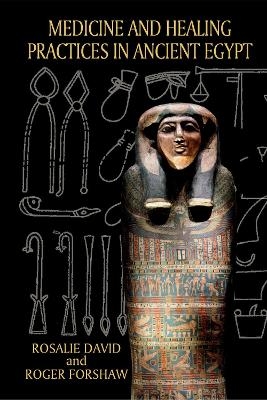
Medicine and Healing Practices in Ancient Egypt
Liverpool University Press (Verlag)
978-1-83764-429-2 (ISBN)
As well as geographical, environmental and dietary factors, which undoubtedly affected general health, some groups were prone to specific hazards. These are discussed in detail, including soldiers’ experience of trauma, wounds and exposure to epidemics; and conditions - blindness, sand pneumoconiosis, trauma and limb amputations – resulting from working conditions at building and other sites.
Methods of diagnosis and treatment were derived from special concepts about disease and medical ethics. These are explored, as well as the individual contributions and professional interactions of various groups of healers and carers. Medical training and practice occurred in various locations, including temples and battlefields; these are described, as well as the treatments and equipment that were available.
Ancient writers generally praised the Egyptian healers’ knowledge, expertise, and professional relationship with their patients. A brief comparison is drawn between this approach and those prevailing elsewhere in Mesopotamia, Greece and Rome. Finally, Egypt’s legacy, transmitted through Greek, Roman and Arabic sources, is confirmed as the source of some principles and practices still found in modern ‘Western’ medicine.
Combining information from the latest studies on human remains and the authors’ biomedical research, this book brings the subject up to date, enabling a wide readership to access often scattered information in a fascinating synthesis.
Rosalie David is Emerita Professor of Egyptology at The University of Manchester. The focus of her career has been the establishment of a new university specialisation – biomedical research within the field of Egyptology – to provide a different approach to understanding the civilisation of ancient Egypt. She was the first Director of the KNH Centre for Biomedical Egyptology at The University of Manchester until her retirement in 2012, and continues her research and teaching at the Centre. She is the author/editor of over 35 books and many journal articles, and has been consultant and contributor to several television documentaries. She has received Fellowships of The Royal Society of Arts and The Royal Society of Medicine, and in the New Year Honours List for 2003, she was awarded the OBE for services to Egyptology. Doctor Roger Forshaw is an honorary lecturer in Biomedical Egyptology at The University of Manchester where he specialises in dental studies and ancient Egyptian healing practices. A former dental surgeon, he went on to study Egyptology at the University of Exeter and later at the University of Manchester where he obtained an MSc in Biomedical Egyptology and achieved a PhD on the role of the lector in ancient Egyptian society. Among his other research interests are the Saite Period and medical and dental care in ancient Egypt, and he has published a number of books and papers on these topics.
Abbreviations
Chronology
Introduction to Egyptian concepts of disease and medical ethics
Providers of healthcare: The healer’s perspective
The temple as a location for medical training and practice
Medical treatment and healing in a community context
Methods of treatment
Recipients of healthcare: The patient’s perspective
Egypt’s contribution to other ancient and modern medical systems
Bibliography
| Erscheinungsdatum | 05.12.2023 |
|---|---|
| Zusatzinfo | 34 Illustrations, color; 50 Illustrations, black and white |
| Verlagsort | Liverpool |
| Sprache | englisch |
| Maße | 163 x 239 mm |
| Themenwelt | Geisteswissenschaften ► Archäologie |
| Geschichte ► Allgemeine Geschichte ► Vor- und Frühgeschichte | |
| Geschichte ► Allgemeine Geschichte ► Altertum / Antike | |
| Studium ► Querschnittsbereiche ► Geschichte / Ethik der Medizin | |
| ISBN-10 | 1-83764-429-2 / 1837644292 |
| ISBN-13 | 978-1-83764-429-2 / 9781837644292 |
| Zustand | Neuware |
| Informationen gemäß Produktsicherheitsverordnung (GPSR) | |
| Haben Sie eine Frage zum Produkt? |
aus dem Bereich


